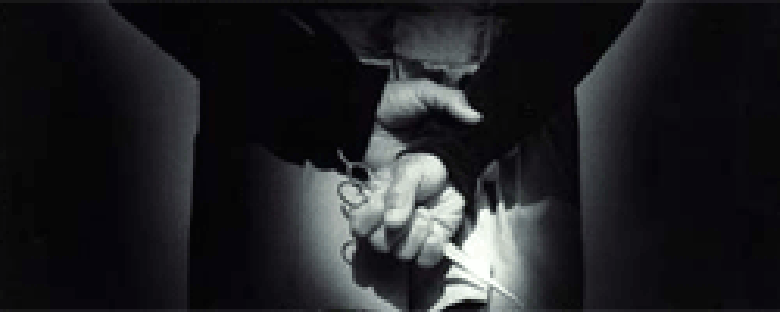Reviews
Micheal Bafaro
Canada / UK, 2001
Credits
Review by Adam Balz
Posted on 15 October 2006
Source Platinum Disc DVD
Related articles
Features: 31 Days of Horror
Americans have an insatiable, almost dizzying interest in serial killers. Drawn from an inexorable need for justification – an interest in the psychology of motive – we pen tomes on their childhoods, their failed relationships and deep-seeded fixations. Whether for preservation or prevention, we attempt to understand, and in the process we create pseudo-celebrities. Or, as Dexter Miles phrases it:
A significant portion of people who make the news are psychopaths. Thieves, swindlers, con men, white-collar criminals, high-prone stock promoters, cult leaders, mercenaries, unscrupulous business people, and serial killers. Watch the news every night at six—they pretty much jump off the screen at you. Most dramatic are the cold-blooded, consciousness killers; it’s no wonder people display so much interest for the likes of John Wayne Gacy, Richard Ramirez, and Ted Bundy. For these people, along with the sensational crimes that they commit, make them perfect 21st-century saints. I can’t help but wonder how many people are glued to their television sets, waiting for the next ripping soundbite. Fascinating.
Dexter Miles is a familiar face in the small town of Revelstoke, Alaska. A practicing barber, he’s privy to all the goings-on about town, offered to him by both indigenous old men and officers of the law—in particular, the young and inexperienced Chief Corgan. Offering amiable conversation and a warm smile as he works, Miles is the essence of a pleasant, trustworthy neighbor. He’s also a dormant serial killer—a homicidal hair-cutter, if you will, who hasn’t taken a life in years. But now, as the perpetual darkness of winter looms, he once again yearns for the thrill of killing.
What separates Dexter from other celluloid serial killers is that he’s never seen satisfying his compulsion. In fact, were it not for a few choice lines in Dexter’s narration, there’d be no connection between the barber and his victims at all; this creates a disassociation between Dexter Miles’ and the disgust we should feel about him that complements a rather intelligent amendment in character—Dexter Miles is likeable.
In American cinema, serial killers are brazen and manipulative, oft-times removed from society by either a reclusive disposition or devastating intellect; they make their presence known at once, emanating a warped psyche or sharp bravado that’s adverse to what serial killers historically are—outwardly unassuming, blue-collar members of their community with only slight visible hints of maniacal tendencies. Hannibal Lecter, who is written as fiercely intelligent and intuitive, is also immensely cultured; a lover of fine art and classical music, he is likable primarily because we recognize his dominance over adversaries. Norman Bates, on the other hand, exudes a rather calm, hypnotic sexuality that makes his character very approachable but also adds to his peculiar temperament. (Robert Bloch’s book refers to Bates as being overly stout and unattractive.) Yet when we contrast Lechter and Bates with the genuine killers of history, we see where The Barber finds its balance. Herb Baumeister, who strangled gay men in Indiana, was the founder of the thrift store Sav-a-Lot; John Wayne Gacy, infamous for hiding his victims beneath the floorboards of his home, worked part-time as a children’s birthday clown; Robert Hansen, who kidnapped women to hunt on his property in Alaska, owned a successful bakery. Dexter Miles is an affable man who’s easily believable as an innocent; the archetypical pillar of his community, even his name, a dull and forgettable moniker, embodies the rustic intimacy associated with serial killers.
Cinematically, The Barber is an elusive combination of underdeveloped characters, unoriginal dialogue (“This guy’s a sick fuck,” “Chief, we’re gonna get this bastard”), and mixed performances. Hindered by eerie similarities to David Lynch’s Twin Peaks, the film strikes an interesting and original vein with incredible infrequence. But when it does – Adam Sliwinski’s beautifully drab cinematography, subtle parallels linking Miles and Corgan, David Abbott as Revelstoke’s omniscient coroner – it succeeds with brilliance. The original soundtrack, which periodically evokes a bleak Danny Elfman, is regularly interrupted by portions of The Barber of Seville—no doubt the clever, playful nature of co-writers Michael Bafaro and Warren Low, traces of which can also be found in the character of Crawley, an FBI agent with fluctuating morals, and the fact that none of Revelstoke’s citizens are likeable; in the end, the former has ostensibly abandoned his impartial responsibilities and become one of the latter. And while horror films are rarely successful at being both mischievous and smart, The Barber is somehow both and neither—a cinematic conundrum with redeeming values but an uncertain future.
We don’t do comments anymore, but you may contact us here or find us on Twitter or Facebook.



